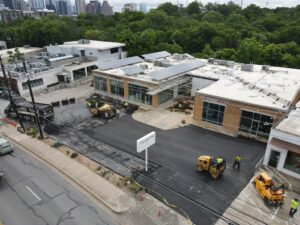 Customers who decide to construct an asphalt pavement are often unaware of the steps that contractors must execute. Although many people have seen rolling machines in action on a highway or street, few understand their importance. Contractors use rolling machines for compaction, and compaction is one of the most important keys to successful asphalt paving projects.
Customers who decide to construct an asphalt pavement are often unaware of the steps that contractors must execute. Although many people have seen rolling machines in action on a highway or street, few understand their importance. Contractors use rolling machines for compaction, and compaction is one of the most important keys to successful asphalt paving projects.
Table of Contents
ToggleWhat Is Compaction?
In general, when you compact something, you exert force on it to remove air and increase the object’s density. A Dallas paving company uses rolling machines to compact the subgrade, base, and hot asphalt.
If My Contractor Does Not Compact My Asphalt Paving Properly, What Might Happen?
Improper compaction will result in a weaker, less stable pavement. The pavement may be more likely to have a bumpy surface, develop ruts, or suffer other serious damage. There have been instances of improper compaction resulting in a total pavement failure in as little as one year. In other words, your pavement will be less attractive, more prone to potholes and alligator cracking, and have a reduced life.
How Do Contractors Compact Asphalt Paving?
Reputable paving contractors begin by compacting the soil that will lie under the pavement. This is the subgrade. Your asphalt paving company will compact the subgrade so that it does not have any soft spots. If the asphalt contractor cannot compact the subgrade sufficiently, it may be necessary to amend the soil. The contractor will excavate some of the soil, then replace it with soil that will be easier to compact properly. When paving Dallas parking lots or roadways, contractors may install an aggregate base that includes a coating of asphalt. If your asphalt contractor chooses to install a base, it will also require compaction to remove air voids. Next, the asphalt paving company begins placing the asphalt courses, compacting each before placing the next. The final course will be the one on which people will walk or drive.
When Paving in Dallas, What Issues Might Cause Improper Compaction of an Asphalt Pavement?
There are several things that could cause improper compaction, including the mix type, the mix aggregates, and the roller type. However, the following are the most common causes of improper compaction.
1. Temperature: Asphalt contractors must monitor more than one temperature. There is the temperature of the asphalt, the temperature of the ground, and the temperature of the air. It is critical to compact the asphalt while it is hot. As the temperature of the ground and air decreases, so does the time that contractors have to achieve compaction. Furthermore, the contractor must carefully schedule the delivery of asphalt from the batch plant. If the contractor leaves truckloads of asphalt waiting for offloading, the asphalt could cool excessively.
2. Lift Thickness: The thickness of the asphalt in a course can present a challenge. Thin lifts will cool faster than thick ones. This means that paving contractors have less time to achieve proper compaction. This challenge usually arises on overlays or other thin pavements. Therefore, if the ground temperature is below a certain point, a contractor may postpone a paving job.
3. Rolling: An asphalt paving company typically owns a variety of rolling machines. The roller must be suitable for the thickness of the asphalt course. Operator error can sometimes be the cause of ineffective rolling that results in poor compaction. The asphalt contractor must also establish an efficient rolling pattern to ensure compaction with the fewest passes.
At HI-TEK Paving Services, we have the expertise to install your asphalt overlay or paving correctly. We also offer asphalt repairs, parking lot striping, asphalt sealcoating, parking lot maintenance, asphalt crack repair, and concrete repair and installation. We are a well-respected company serving most locations in the Dallas-Fort Worth metroplex. We have an exceptional reputation for superb craftsmanship and exemplary service. If you wish to request a free quote, just submit the online form, or give us a call at 214-908-9641.
